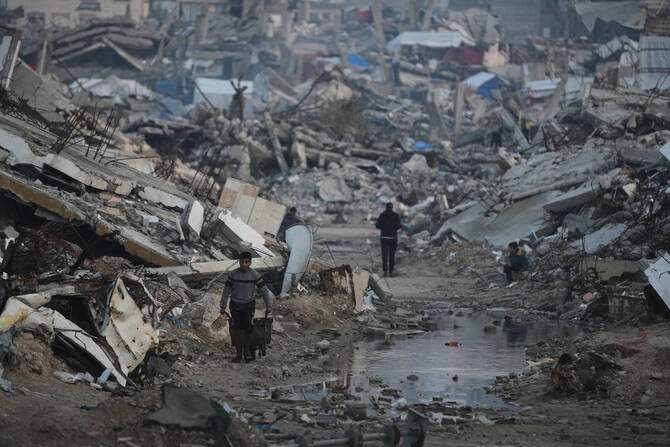With roosters crowing in the background as he speaks from the crowded refugee camp in Bangladesh that’s been his home since 2017, Maung Sawyeddollah, 21, describes what happened when violent hate speech and disinformation targeting the Rohingya minority in Myanmar began to spread on Facebook.
“We were good with most of the people there. But some very narrow minded and very nationalist types escalated hate against Rohingya on Facebook,” he said. “And the people who were good, in close communication with Rohingya. changed their mind against Rohingya and it turned to hate.”
For years, Facebook, now called Meta Platforms Inc., pushed the narrative that it was a neutral platform in Myanmar that was misused by malicious people, and that despite its efforts to remove violent and hateful material, it unfortunately fell short. That narrative echoes its response to the role it has played in other conflicts around the world, whether the 2020 election in the US or hate speech in India.
But a new and comprehensive report by Amnesty International states that Facebook’s preferred narrative is false. The platform, Amnesty says, wasn’t merely a passive site with insufficient content moderation. Instead, Meta’s algorithms “proactively amplified and promoted content” on Facebook, which incited violent hatred against the Rohingya beginning as early as 2012.
Despite years of warnings, Amnesty found, the company not only failed to remove violent hate speech and disinformation against the Rohingya, it actively spread and amplified it until it culminated in the 2017 massacre. The timing coincided with the rising popularity of Facebook in Myanmar, where for many people it served as their only connection to the online world. That effectively made Facebook the Internet for a vast number of Myanmar’s population.
More than 700,000 Rohingya fled into neighboring Bangladesh that year. Myanmar security forces were accused of mass rapes, killings and torching thousands of homes owned by Rohingya.
“Meta — through its dangerous algorithms and its relentless pursuit of profit — substantially contributed to the serious human rights violations perpetrated against the Rohingya,” the report says.
A spokesperson for Meta declined to answer questions about the Amnesty report. In a statement, the company said it “stands in solidarity with the international community and supports efforts to hold the Tatmadaw accountable for its crimes against the Rohingya people.”
“Our safety and integrity work in Myanmar remains guided by feedback from local civil society organizations and international institutions, including the UN Fact-Finding Mission on Myanmar; the Human Rights Impact Assessment we commissioned in 2018; as well as our ongoing human rights risk management,” Rafael Frankel, director of public policy for emerging markets, Meta Asia-Pacific, said in a statement.
Like Sawyeddollah, who is quoted in the Amnesty report and spoke with the AP on Tuesday, most of the people who fled Myanmar — about 80 percent of the Rohingya living in Myanmar’s western state of Rakhine at the time — are still staying in refugee camps. And they are asking Meta to pay reparations for its role in the violent repression of Rohingya Muslims in Myanmar, which the US declared a genocide earlier this year.
Amnesty’s report, out Wednesday, is based on interviews with Rohingya refugees, former Meta staff, academics, activists and others. It also relied on documents disclosed to Congress last year by whistleblower Frances Haugen, a former Facebook data scientist. It notes that digital rights activists say Meta has improved its civil society engagement and some aspects of its content moderation practices in Myanmar in recent years. In January 2021, after a violent coup overthrew the government, it banned the country’s military from its platform.
But critics, including some of Facebook’s own employees, have long maintained such an approach will never truly work. It means Meta is playing whack-a-mole trying to remove harmful material while its algorithms designed to push “engaging” content that’s more likely to get people riled up essentially work against it.
“These algorithms are really dangerous to our human rights. And what happened to the Rohingya and Facebook’s role in that specific conflict risks happening again, in many different contexts across the world,” said Pat de Brún, researcher and adviser on artificial intelligence and human rights at Amnesty.
“The company has shown itself completely unwilling or incapable of resolving the root causes of its human rights impact.”
After the UN’s Independent International Fact-Finding Mission on Myanmar highlighted the “significant” role Facebook played in the atrocities perpetrated against the Rohingya, Meta admitted in 2018 that “we weren’t doing enough to help prevent our platform from being used to foment division and incite offline violence.”
In the following years, the company “touted certain improvements in its community engagement and content moderation practices in Myanmar,” Amnesty said, adding that its report “finds that these measures have proven wholly inadequate.”
In 2020, for instance, three years after the violence in Myanmar killed thousands of Rohingya Muslims and displaced 700,000 more, Facebook investigated how a video by a leading anti-Rohingya hate figure, U Wirathu, was circulating on its site.
The probe revealed that over 70 percent of the video’s views came from “chaining” — that is, it was suggested to people who played a different video, showing what’s “up next.” Facebook users were not seeking out or searching for the video, but had it fed to them by the platform’s algorithms.
Wirathu had been banned from Facebook since 2018.
“Even a well-resourced approach to content moderation, in isolation, would likely not have sufficed to prevent and mitigate these algorithmic harms. This is because content moderation fails to address the root cause of Meta’s algorithmic amplification of harmful content,” Amnesty’s report says.
The Rohingya refugees are seeking unspecified reparations from the Menlo Park, California-based social media giant for its role in perpetuating genocide. Meta, which is the subject of twin lawsuits in the US and the UK seeking $150 billion for Rohingya refugees, has so far refused.
“We believe that the genocide against Rohingya was possible only because of Facebook,” Sawyeddollah said. “They communicated with each other to spread hate, they organized campaigns through Facebook. But Facebook was silent.”
Rohingya seek reparations from Facebook for role in massacre
https://arab.news/bgp3s
Rohingya seek reparations from Facebook for role in massacre

- “Meta — through its dangerous algorithms and its relentless pursuit of profit — substantially contributed to the serious human rights violations perpetrated against the Rohingya,” the report says
Foreign media group slams Israel for refusing to lift Gaza press ban

- Foreign Press Association expresses 'profound disappointment' with Israeli government’s response to a Supreme Court appeal
- Israel has barred foreign journalists from independently entering the devastated territory since the war started
JERUSALEM: An international media association on Tuesday criticized the Israeli government for maintaining its ban on unrestricted media access to Gaza, calling the move disappointing.
The government had told the Supreme Court in a submission late Sunday that the ban should remain in place, citing security risks in the Gaza Strip.
The submission was in response to a petition filed by the Foreign Press Association (FPA) — which represents hundreds of journalists in Israel and Palestinian territories — seeking immediate and unrestricted access for foreign journalists to the Gaza Strip.
“The Foreign Press Association expresses its profound disappointment with the Israeli government’s latest response to our appeal for full and free access to the Gaza Strip,” the association said on Tuesday.
“Instead of presenting a plan for allowing journalists into Gaza independently and letting us work alongside our brave Palestinian colleagues, the government has decided once again to lock us out” despite the ceasefire in the territory, it added.
Since the outbreak of the Gaza war in October 2023, triggered by an attack on Israel by the Palestinian militant group Hamas, the government has barred foreign journalists from independently entering the devastated territory.
Instead, Israel has allowed only a limited number of reporters to enter Gaza on a case-by-case basis, embedded with its military inside the blockaded Palestinian territory.
The FPA filed its petition in 2024, after which the court granted the government several extensions to submit its response.
Last month, however, the court set January 4 as a final deadline for the government to present a plan for allowing media access to Gaza.
In its submission, the government maintained that the ban should remain in place.
“This is for security reasons, based on the position of the defense establishment, which maintains that a security risk associated with such entry still exists,” the government submission said.
The government also said that the search for the remains of the last hostage held in Gaza was ongoing, suggesting that allowing journalists in at this stage could hinder the operation.
The remains of Ran Gvili, whose body was taken to Gaza after he was killed during Hamas’s 2023 attack, have still not been recovered despite the ceasefire.
The FPA said it planned to submit a “robust response” to the court, and expressed hope the “judges will put an end to this charade.”
“The FPA is confident that the court will provide justice in light of the continuous infringement of the fundamental principles of freedom of speech, the public’s right to know and free press,” the association added.
The Supreme Court is expected to issue a ruling on the matter, though it is unclear when a decision will be handed down.
An AFP journalist sits on the board of the FPA.














